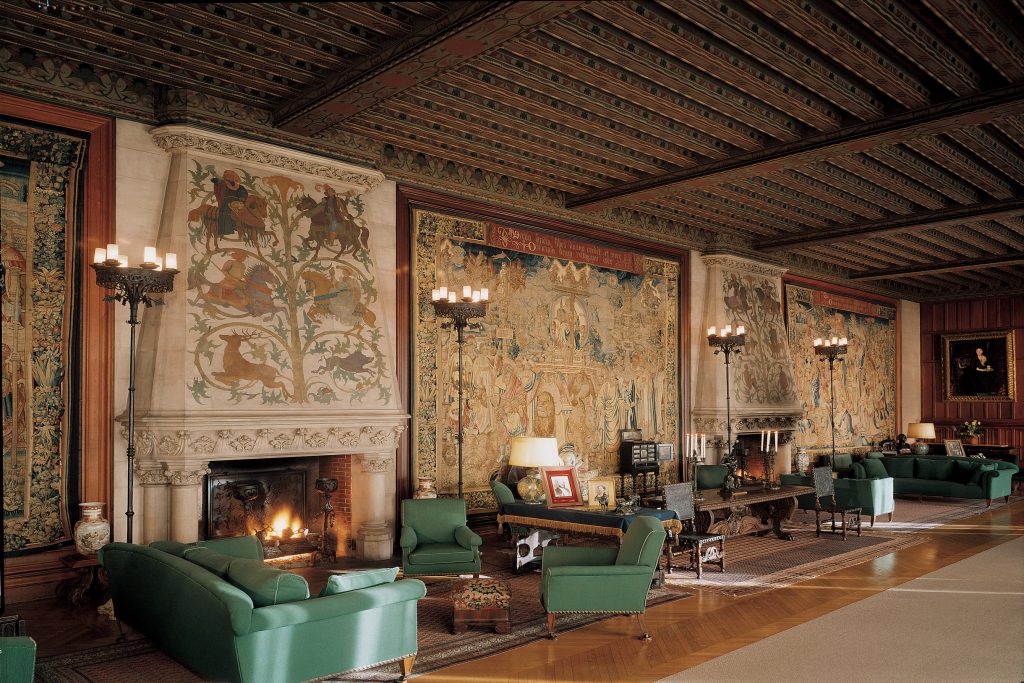
Amid the stunning beauty of the Blue Ridge Mountains, there is a historic house whose grandeur rivals the mountains themselves.
The 250-room mansion known as Biltmore, one of the most spectacular homes ever built in North America, is famous for its opulent architecture and sprawling grounds. Although the house’s exterior makes an unforgettable first impression, visitors will find that the estate offers stunning artistry inside and out.
George Vanderbilt and the Arts Completed in 1895, Biltmore was intended to be the country home of George Vanderbilt, a millionaire with a unique sense of style. To design Biltmore, he chose brilliant architect Richard Morris Hunt and the legendary landscape designer Frederick Law Olmsted, who created a home suitable for a man who treasured fine art.
Completed in 1895, Biltmore was intended to be the country home of George Vanderbilt, a millionaire with a unique sense of style. To design Biltmore, he chose brilliant architect Richard Morris Hunt and the legendary landscape designer Frederick Law Olmsted, who created a home suitable for a man who treasured fine art.
A proud patron of the arts, Vanderbilt hosted literary icons like Edith Wharton and Henry James at the estate. He sponsored some of the most famous artists in American history, including masters of portraiture John Singer Sargent and James McNeill Whistler. He collected works by prolific European artists Rembrandt and Albrecht Dürer and used his fortune to make art more accessible to the public, funding free libraries and the American Fine Arts Society in New York.
A World-Class Collection
When Biltmore was completed, Vanderbilt insisted on filling it with art as beautiful as the house itself. For this task, he brought a collector’s keen eye, choosing works at the cutting edge of late 19th century art.

Maxime Maufra’s “Vue du Port” (“View of the Harbor in Sunset”)

Ignacio Zuloaga’s “Rosita”
Two of the most stunning paintings at Biltmore are portraits by impressionist Pierre-Auguste Renoir, who, at that point, was far from the household name he is today. These lush paintings, on display in the house’s Breakfast Room, are among the first of Renoir’s to arrive in the United States.

Pierre-Auguste Renoir’s “Young Algerian Woman”
Equally impressive is the house’s collection of Ming vases. The Vanderbilts used these 16th and 17th century porcelain urns as planters, but they were designed as colossal goldfish bowls. The seal of the Chinese emperor marks them as not only exquisitely lovely but rare as well.
The Cutting Edge of Preservation The experts of Biltmore’s in-house conservation department are responsible for the vital work of maintaining Vanderbilt’s collection and the majestic house that holds it. Although their work is performed behind the scenes, it shines through every room. This meticulously maintained collection is a time capsule of life in the Gilded Age.
The experts of Biltmore’s in-house conservation department are responsible for the vital work of maintaining Vanderbilt’s collection and the majestic house that holds it. Although their work is performed behind the scenes, it shines through every room. This meticulously maintained collection is a time capsule of life in the Gilded Age.
In addition to caring for the paintings and sculptures in the house, the conservationists work tirelessly to ensure that every inch of Biltmore feels true to the life of the Vanderbilts. When it came time to restore the lavish guest bedroom known as the Tyrolean Chimney Room, for instance, the conservation staff commissioned an internationally respected French firm to recreate the wallpaper that once hung in the room – making a covering that is not only historically accurate but also beautiful.
That level of commitment is what it takes to keep an 1890s treasure sparkling well into the 21st century. From the paintings on the walls to the walls themselves, Biltmore is truly a work of art.
Biltmore has adapted estate experiences and enhanced their stringent disinfection procedures in accordance with CDC guidelines and industry best practices. They are committed to taking precautionary measures to make sure all guests are safe and comfortable. You can read more about their health and safety guidelines here.




